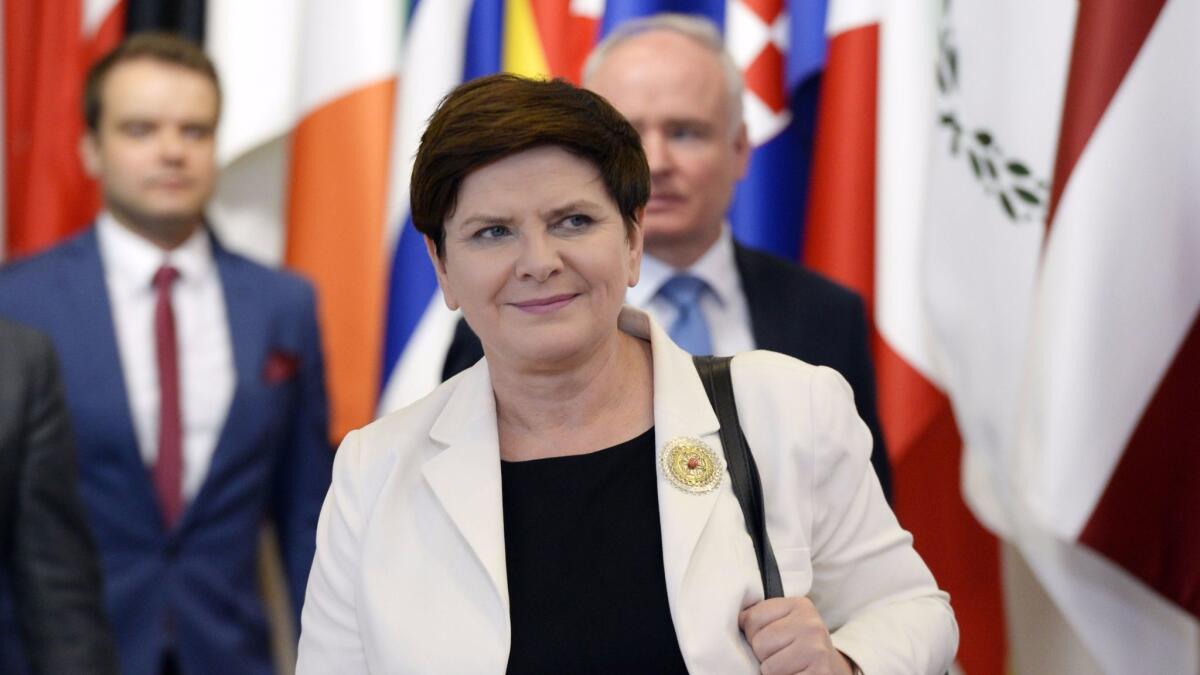British proposal on citizens’ rights after Brexit fails to impress European Union

- Share via
Reporting from Brussels — European Union leaders Friday were not impressed with British Prime Minister Theresa May’s initial proposal to protect the rights of millions of citizens from different countries when Britain exits the bloc.
May’s offer to agree to residency, healthcare and other social benefits to citizens from the other 27 EU countries who have lived in Britain for five years or more fell far short, according to several EU leaders at a summit in Brussels.
“My first impression is that the UK’s offer is below our expectations, and that it risks worsening the situation of citizens,” Donald Tusk, the president of the European Council, told reporters Friday.
About 3 million EU citizens live in Britain and more than 1 million Britons live elsewhere in Europe.
Members of the EU’s 27 remaining nations said they wanted more details from Britain after May made her pitch Thursday, on the eve of the first anniversary of the so-called Brexit referendum.
Last year, British voters favored leaving the EU by 52% to 48%. Formal negotiations over the exit started this week.
Officials working at the EU institutions in Brussels have complained that May’s government is disorganized and does not have a grasp on what kind of divorce deal it is aiming for.
May has argued in favor of a “hard Brexit,” meaning Britain would leave the bloc and an EU customs arrangement, forcing the two sides to redraw their trade relationship and end EU citizens’ right to live in the UK without a visa.
European Commission President Jean-Claude Juncker answered “no” when asked Friday if he had a clearer idea of what kind of exit the British government wants.
Citizens’ rights is a major issue in the negotiations, which are expected to last until early 2019. EU leaders want a guarantee that their citizens living in Britain will have legal rights including residency after the breakup.
May said Friday that her offer was “fair and serious.” She is expected to present more details Monday when she addresses Parliament in London.
German Chancellor Angela Merkel called May’s proposal “a good beginning.”
“But it was — I’m trying to word this very carefully — it was not a breakthrough. We have said we want to pursue this matter through good cooperation but I think what came out yesterday is that we have a very long way to go,” Merkel said.
Austrian Chancellor Christian Kern said, “There are a lot of details left open.”
Citizens from all 28 EU nations currently have the right to live in any of the countries without a visa. That is expected to change for people who move to Britain, and for British citizens in the rest of Europe, after the UK leaves the bloc.
The EU leaders have set two other priorities for the negotiations. They argue that the UK must pay a sum estimated to be as high as $100 billion in budget obligations before it leaves.
They also want the UK to guarantee that Brexit will not endanger peace between Ireland, an EU member, and Northern Ireland, which is part of Britain. The 1998 Good Friday Agreement put a stop to decades of violence between sectarian groups in the two countries.
Stupp is a special correspondent.
More to Read
Sign up for Essential California
The most important California stories and recommendations in your inbox every morning.
You may occasionally receive promotional content from the Los Angeles Times.










